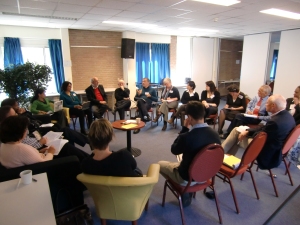After exploring and discussing (on day 1) the various pieces of research work that have been undertaken in IKM-Emergent until now, the second day of the workshop started with a world café and continued with a ‘birds of a feather session’ (a marketplace / less-open space method) where we explored some ideas for the end of the programme and a potential IKM-Emergent 2 programme. The last day of the programme put us in action planning mode around crucial activities.
The key points that came up in the strands of work I was involved on this second and third day of the meeting:
- More attention will be paid to communication: internal communication to increase the awareness of all IKM-E members about each other’s work but also more external communication to engage with a wider group of development actors. The role of social media has been raised as a crucial point in case to leverage the great work of IKM-E to the wider world. Along with the Giraffe, IKM-E blog and the wiki, there is potential to use del.icio.us, to use Twitter (anyways I’ve been tweeting around the hash tag #ikm-e) and perhaps Slideshare or other tools.
- The various strands of the programme will come together in some respect to reinforce each other: ripples of participation, local content/knowledge, emergence, traducture, multiple knowledges coming together in an approach that recognises complexity and power issues.
- In the last 18 months of this programme, the IKM group will come up with various practical outputs which can be mobilised and used more easily by development agents to reflect on and adapt values, behaviours and practices: books, guidelines, checklists (of critical questions, questions and more questions), workshops, video explanations of our work, an overall narrative for the IKM programme that offers a comprehensive understanding of the issues we are questioning etc.
- One interesting output that we will be working on is the apply our work to the current change process in which a couple of development organisations are involved, to see how helpful it is and help these organisations reflect critically on their approach to knowledge-focused development work. This activity will culminate with a learning workshop in 2011 where we may prepare additional action research activities as part of a future programme.
- The IKM-2 programme in preparation will not just advocate for multiple knowledges and the likes but will actually consistently practice what it preaches and organise joint action-research work / collective inquiries (including participants from NGOs, knowledge institutes, community members, donor agency representatives, governmental agents, artists and the media) on a number of topics. This will help us: demonstrate the power, potential and strategic value but also the challenges of bringing together multiple knowledges. It will also help us develop a multiple accountability system that stimulates us to change perspectives and practices through joint action and ownership.
- This future programme will continue operating as a network of passionate and capable individuals creating opportunities for IKM to build upon existing work or new ideas, but it will also establish more firm relations with a wide variety of networks (and journals such as the KM4Dev journal) and institutions to accompany and strengthen our questioning work.
This has been an extremely juicy two final days with a delicious fruit salad of insights and ideas, approaches and concepts. The academic head and practice-oriented arms of IKM-Emergent are still working in a somewhat disjointed fashion, but that is as natural as waking up and not yet having adjusted body coordination; nonetheless the body is wobbling on and indeed moving forward. We have been dreaming profoundly and we are now putting our dreams to action. Let’s hope we can soon take a good walk and later on run to co-create relevant next (not best) practices of sustainable and people-centred development.
By the way, some pictures of this IKM-Emergent meeting are available on: http://www.flickr.com/groups/ikm_emergent/pool/
Filed under: conferences, IKM Emergent | Tagged: development sector, IKM Emergent, IKM-2, Knowledge management, multiple knowledges, Wageningen | Leave a comment »






